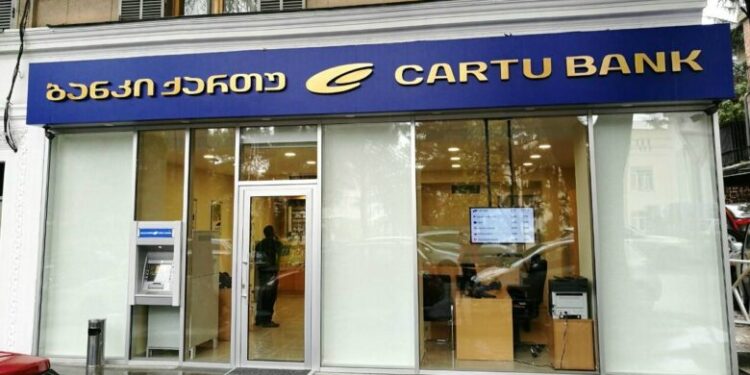Cartu Bank, founded by Georgian Dream’s influential backer Bidzina Ivanishvili, has filed a defamation lawsuit against opposition-leaning TV Pirveli for referring to the bank as still being under the billionaire’s control. Critics view the move as a legal maneuver to publicly distance the institution from its politically exposed founder, particularly as fears grow over potential international sanctions.
“Cartu Bank has launched a legal case against TV Pirveli, demanding the channel refrain from describing it as ‘Ivanishvili’s bank’ or ‘the oligarch’s bank,’” the television station reported on July 29. The lawsuit reportedly claims that the bank has “no connection with Ivanishvili.”
Though the full complaint has not been made public, excerpts aired by the channel reference a May 1 broadcast in which reporters called Cartu Bank “the oligarch’s bank” and claimed that Ivanishvili had “repeatedly used the bank to conceal wealth.” The segment also referred to his alleged “fictitious divorce,” asserting that the bank still serves the financial interests of Ivanishvili and his inner circle.
Cartu Bank is currently owned by the International Charity Fund Cartu, an organization also founded by Ivanishvili. Ownership of the bank was formally transferred to the fund in 2021, with his son, Uta Ivanishvili, listed as the beneficial owner in recent declarations.
The lawsuit argues that TV Pirveli’s reporting misleads the public and falsely portrays the bank as Ivanishvili’s personal asset. “These claims politicize Cartu Bank, harm its professional reputation, and are based on detached-from-reality, distorted, and false information,” the complaint states.
The broadcast in question concerned a resolution by the European People’s Party — the largest political faction in the European Parliament — which called for sanctions against Ivanishvili and urged removing Cartu Bank from the SWIFT international payment network. According to the bank, TV Pirveli’s coverage described it as “non-transparent,” an accusation it characterizes as “clear defamation.”
Cartu Bank cites Georgia’s Law on Freedom of Speech and Expression, specifically the defamation clause, though it remains unclear whether additional legal grounds are being pursued. Recent amendments to the defamation law, passed by the Georgian Dream-controlled parliament in April, have shifted the burden of proof onto defendants. This means that TV Pirveli must now prove its reporting did not harm the bank’s reputation — a move widely criticized as a threat to press freedom.
The lawsuit also comes on the heels of a ruling by Georgia’s Communications Commission, which found TV Pirveli and another opposition-aligned channel, Formula, in violation of broadcasting standards after airing content that questioned the legitimacy of the ruling party. Media watchdogs and civil society groups say the decision is part of a broader crackdown on critical media, reinforced by restrictive legislation and new limitations on foreign funding.
Irakli Abesadze, founder of the Center for Civil Involvement, called the case “strange,” questioning how a financial institution could see association with its founder as defamatory.
“But it’s also obvious that they’re trying to use the Murusidze court,” he added — referring to Georgia’s judiciary, often accused of political bias and symbolized by controversial judge Levan Murusidze — “to strategically distance themselves from Ivanishvili, whose name may soon be the target of serious international sanctions.”














